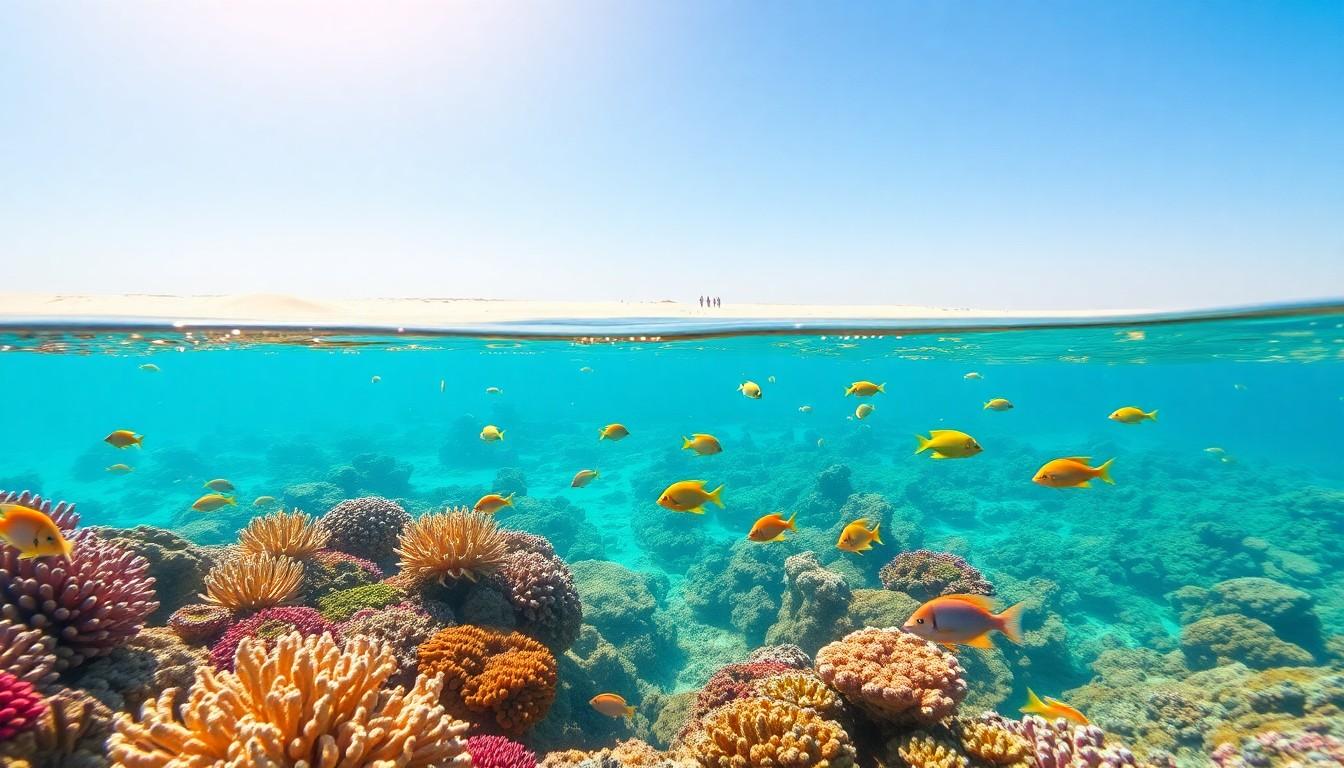Saudi Arabia isn’t just about deserts and camels anymore. With a newfound focus on eco-tourism, it’s transforming into a green paradise that’ll make nature lovers swoon. Imagine exploring stunning landscapes, from the Red Sea’s coral reefs to the lush mountains of Asir, all while contributing to environmental sustainability. Who knew saving the planet could be this much fun?
Saudi Arabia Eco Tourism
Saudi Arabia’s eco-tourism sector showcases extraordinary efforts in sustainability and conservation. Visitors experience a range of diverse ecosystems, from pristine beaches to arid deserts and mountainous regions. The Red Sea, known for its vibrant coral reefs, invites explorers eager to dive into rich marine life. Sustainable practices enhance these experiences, ensuring minimal environmental impact.
Asir region boasts lush landscapes gifted with unique flora and fauna. Travelers can hike through the scenic mountains, immersing themselves in nature while promoting regional conservation efforts. Ecological tours offer insights into local culture, history, and the importance of preserving habitats for future generations.
Many resorts and lodges incorporate green building practices, utilizing renewable energy sources and water conservation techniques. Engaging in activities like birdwatching and hiking allows visitors to connect with nature and understand the region’s ecological significance. Guided tours led by knowledgeable experts foster a deeper appreciation for Saudi Arabia’s natural treasures.
Government initiatives also support eco-tourism development. Creating protected areas and national parks ensures the preservation of sensitive environments while attracting eco-conscious travelers. Sustainable tourism helps to boost the local economy and create jobs within communities.
With its commitment to environmental stewardship, Saudi Arabia positions itself as a premier eco-tourism destination. Visitors contribute to conservation efforts, supporting both the environment and the local cultural heritage. Eco-tourism in Saudi Arabia not only offers adventure but also fosters responsibility and respect for nature.
Key Destinations for Eco Tourism

Saudi Arabia boasts numerous destinations ideal for eco-tourism, showcasing its commitment to environmental conservation and cultural preservation.
Nature Reserves
Nature reserves offer unique opportunities to explore Saudi Arabia’s rich biodiversity. One prominent reserve, the Asir National Park, features diverse ecosystems ranging from forests to grasslands. Visitors may encounter fascinating wildlife, including native bird species, which enhances their outdoor experience. Another example, the Farasan Islands, consists of pristine beaches and vibrant coral reefs, attracting marine enthusiasts. These areas emphasize sustainable tourism practices, ensuring that natural habitats remain protected while allowing guests to participate in guided eco-tours and educational experiences.
Coastal Attractions
Coastal attractions highlight Saudi Arabia’s stunning marine environments. The Red Sea coast, with its crystal-clear waters, supports extensive coral reefs and diverse marine life. Tourists often engage in activities such as snorkeling and diving, exploring underwater wonders responsibly. Additionally, the Alula region offers breathtaking views of rock formations and archaeological sites near the coastline. Visiting these coastal areas allows travelers to appreciate the natural beauty while fostering a sense of environmental stewardship that benefits both local communities and ecosystems.
Unique Experiences in Saudi Arabia Eco Tourism
Saudi Arabia offers diverse eco-tourism experiences that immerse visitors in its natural beauty and cultural richness. From unique cultural encounters to thrilling adventure activities, the kingdom showcases its commitment to sustainability.
Cultural Encounters
Travelers can engage with local communities through cultural experiences that highlight the significance of traditions. Visitors often participate in workshops, where they learn about traditional crafts and local cuisine. Many eco-lodges provide authentic Saudi meals, prepared with locally sourced ingredients. Local guides share stories about the heritage and customs unique to each region, enhancing personal connections with the environment. Traditional music performances complement these encounters, creating a vibrant cultural tapestry. Such experiences foster mutual respect for local cultures and emphasize the importance of preserving customs alongside natural habitats.
Adventure Activities
For those seeking excitement, various adventure activities beckon. Hiking trails in the Asir Mountains challenge outdoor enthusiasts, offering breathtaking views and encounters with unique wildlife. Desert safaris give travelers a chance to explore vast sand dunes, promoting appreciation for the arid ecosystem. Water sports, including kayaking and snorkeling along the Red Sea coast, introduce visitors to vibrant marine life while emphasizing eco-friendly practices. Birdwatching tours in protected areas reveal diverse avian species, making for memorable experiences. Each activity encourages participants to engage with nature responsibly while enjoying the thrill of adventure.
Sustainable Practices in Eco Tourism
Saudi Arabia emphasizes sustainability through various eco-tourism initiatives. Eco-lodges adopt green building materials and renewable energy sources, minimizing their environmental impact. Many resorts integrate local traditions and use resources efficiently, promoting energy conservation and reducing waste.
In preserving natural habitats, government policies support the establishment of protected areas. Asir National Park and the Farasan Islands highlight the nation’s commitment to conserving biodiversity. Guided eco-tours encourage visitors to appreciate local flora and fauna, while directly contributing to conservation efforts.
Local communities also benefit from these practices. Cultural workshops offer tourists the chance to engage with traditional crafts and cuisine, fostering a sense of respect and understanding between visitors and residents. Engaging in responsible adventure activities, like hiking and snorkeling, empowers travelers to experience the beauty of nature while minimizing their impact.
Recycling initiatives and waste management programs enhance the sustainability of eco-tourism sites. Many facilities implement strict policies to dispose of waste responsibly, further promoting environmental awareness. Birdwatching tours and wildlife observations encourage guests to connect with local ecosystems, inspiring a passion for conservation.
The government invests in eco-tourism education, raising awareness about the importance of sustainable practices. Educational programs highlight the significance of environmental stewardship, targeting both locals and visitors. This focus ensures that eco-tourism continues to thrive, offering benefits to the environment and communities alike.
Saudi Arabia’s eco-tourism model prioritizes ecological preservation, cultural heritage, and community engagement, making it a leading destination for responsible travel.
Challenges Facing Eco Tourism in Saudi Arabia
Eco-tourism in Saudi Arabia encounters several challenges that could hinder its growth. Infrastructure development remains a primary concern. Limited access to remote eco-tourism sites deters potential visitors, making travel logistics complicated.
Environmental degradation also poses a significant threat. The increase in tourism can lead to habitat destruction if not managed responsibly. Overcrowding in popular areas risks overwhelming local ecosystems and diminishing the very beauty that attracts tourists.
Regulatory frameworks often lack the rigor necessary for sustainable practices. Ensuring that eco-tourism operators adhere to environmental guidelines requires consistent monitoring and enforcement. Without robust regulations, eco-tourism can transition into standard tourism, negating its sustainable intent.
Local community involvement is crucial for successful eco-tourism. Many communities lack adequate training and resources to engage effectively in tourism-related activities. Fostering empowerment through education and resources would enable locals to participate meaningfully while preserving their cultural heritage.
Sociopolitical factors also influence eco-tourism development. As the country opens its doors to more international visitors, perceptions regarding safety and stability can affect tourism flow. Heightened awareness and effective communication are vital to assure travelers of their safety when visiting.
Economic factors contribute to the unpredictability of the eco-tourism sector. Fluctuating oil prices impact overall economic stability, which in turn affects disposable income for leisure activities. Focusing investment on eco-tourism initiatives can create more robust economic pathways for local communities.
Addressing these challenges is essential for Saudi Arabia to truly position itself as a leader in eco-tourism. By prioritizing sustainable practices, stakeholder engagement, and infrastructure development, the country can enhance its eco-tourism offerings while preserving its unique natural and cultural treasures.
Natural and Cultural Heritage
Saudi Arabia’s commitment to eco-tourism marks a significant step towards preserving its natural and cultural heritage. By promoting sustainable practices and engaging local communities, the country is transforming its diverse landscapes into prime destinations for environmentally conscious travelers. The unique experiences offered in regions like Asir and along the Red Sea not only highlight the beauty of the environment but also foster a deeper connection to local cultures.
As the nation continues to develop its eco-tourism sector, the focus on sustainability and conservation will play a pivotal role in ensuring that both the environment and local economies thrive. With ongoing government support and community involvement, Saudi Arabia is poised to become a leader in eco-tourism, inviting travelers to explore its wonders responsibly while contributing to a sustainable future.

